If you’re wondering how long activated carbon lasts in a water filter, you’re in the right place. Activated carbon, derived from organic materials like coconut shells, wood, and peat, is a key component of these filters, designed to scrub your water clean of impurities. Now let’s take a deep dive into the lifespan of these filters.
The Lifespan of Activated Carbon
Typically, activated carbon filters can do their job effectively for 2 to 4 weeks from the time they’re first used. Manufacturers usually suggest swapping them out every 4-6 months to ensure optimal performance. In their original packaging, these filters can sit on the shelf for up to 3 years from the sale date.

Factors That Influence the Lifespan of Activated Carbon Filters
Several factors can impact how long your activated carbon filters last.
- Water Quality and Contaminant Levels: If your water contains high levels of certain contaminants like chlorine, sediment, and volatile organic compounds (VOCs), your filter may fill up quicker and need more frequent replacements.
- Frequency of Use: How often you use your filter can also impact its lifespan. A filter used by an entire household will likely need replacing more often than one used by just one or two people. Keep an eye on your filter and replace it when necessary to maintain clean and safe drinking water.
- Filter Size and Quality: The filter’s size and quality also play a part. Larger filters can typically filter more water at once, and might not become clogged as quickly as smaller filters. Higher-quality filters often last longer and filter more effectively, though they might come with a higher price tag.
The Benefits of Activated Carbon Water Filters
Using an activated carbon filter offers a host of benefits, especially for those aiming for clean and pure drinking water.
- Removal of Chemicals and Toxins: Activated carbon filters excel at absorbing and trapping impurities like chlorine, VOCs, pesticides, and other toxins. They’re especially good at improving the taste and quality of your drinking water by eliminating bad tastes and odors.
- Easy Installation and Use: These filters are easy to install and maintain. They’re designed to attach directly to a faucet or to fit into a water filtration pitcher.
- Compatibility with Various Filtration Systems: Activated carbon filters can work well with many types of water filtration systems, adding to their versatility. They can serve as standalone systems, be part of a larger filtration system, or be used with under-sink filters and whole-house filtration systems.
When to Replace Your Activated Carbon Filter
As a rule of thumb, aim to replace your activated carbon filter every two to four weeks, though this can vary based on water quality and usage. Here are some signs your filter needs replacing:
- Discoloration of Water: A change in water color to yellow, brown, or green can indicate your filter has absorbed its fill of impurities and metals and needs to be replaced.
- Unusual Odor or Taste: If your water starts to smell or taste bad, this could mean your filter is saturated with contaminants and is no longer working effectively.
- Decreased Flow Rate: A noticeable decrease in the flow rate from your filter suggests it’s clogged with trapped particles and contaminants and nearing the end of its lifespan. If you observe this, it’s best to replace the filter as soon as possible.
Tips to Extend Your Activated Carbon Filter’s Life
To get the most from your filter, consider these tips:
- Use High-Quality Water Sources: Using cleaner water sources can reduce the number of contaminants your filter needs to remove, prolonging its life.
- Avoid High Water Temperatures: Activated carbon filters work best within a certain temperature range, and exposure to extreme temperatures can degrade them faster.
- Clean Filters Regularly: Cleaning your filters can help remove trapped contaminants, extending the filter’s life.
The Consequences of Not Changing Your Filter
Neglecting to change your activated carbon filter regularly can impact the quality of your water. Once the filter material becomes saturated with impurities, it won’t be able to absorb any more, and contaminants can get into your drinking water. So, remember to check and replace your activated carbon filter regularly to ensure you’re getting clean, safe water.

Jay
Jay is a health and wellness enthusiast with expertise in water quality and nutrition. As a knowledgeable advocate for holistic well-being, Jay successfully manages Type 2 Diabetes through informed lifestyle choices. Committed to sharing reliable and authoritative insights, Jay combines firsthand experience with a passion for enhancing health."
